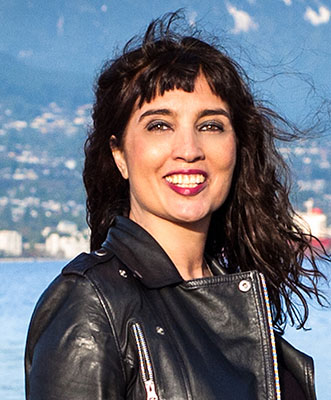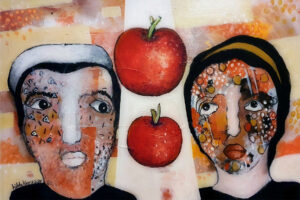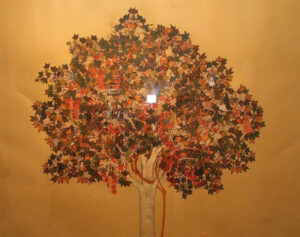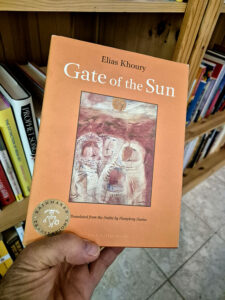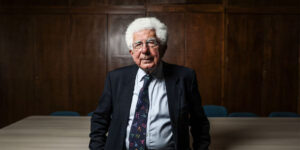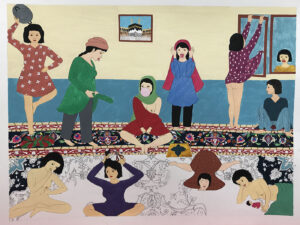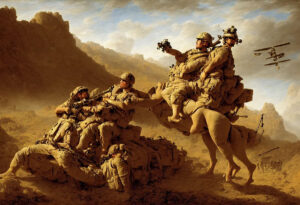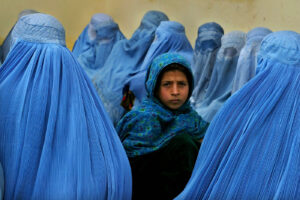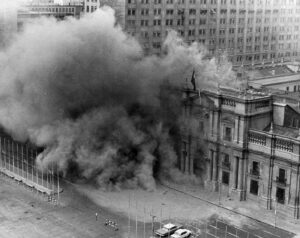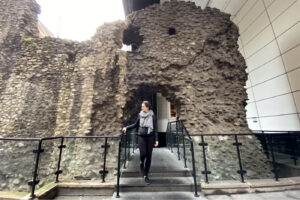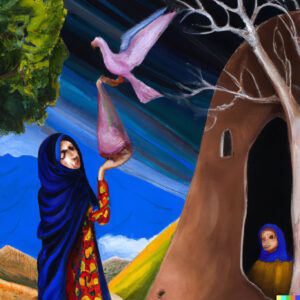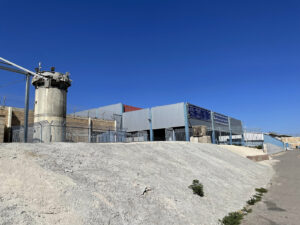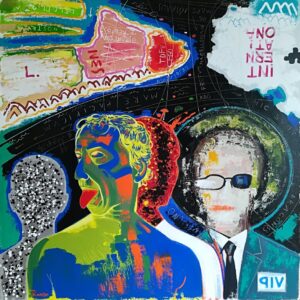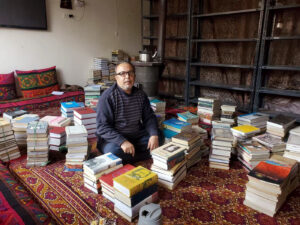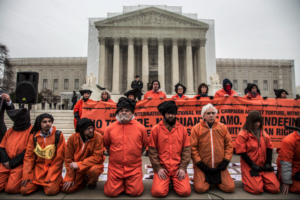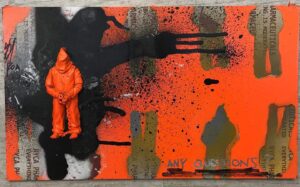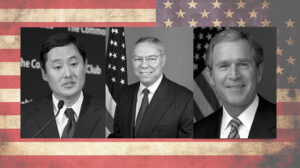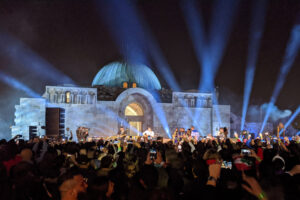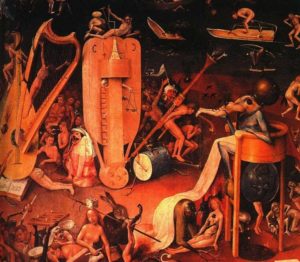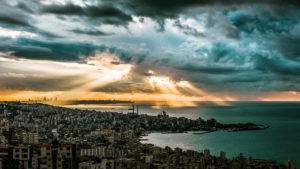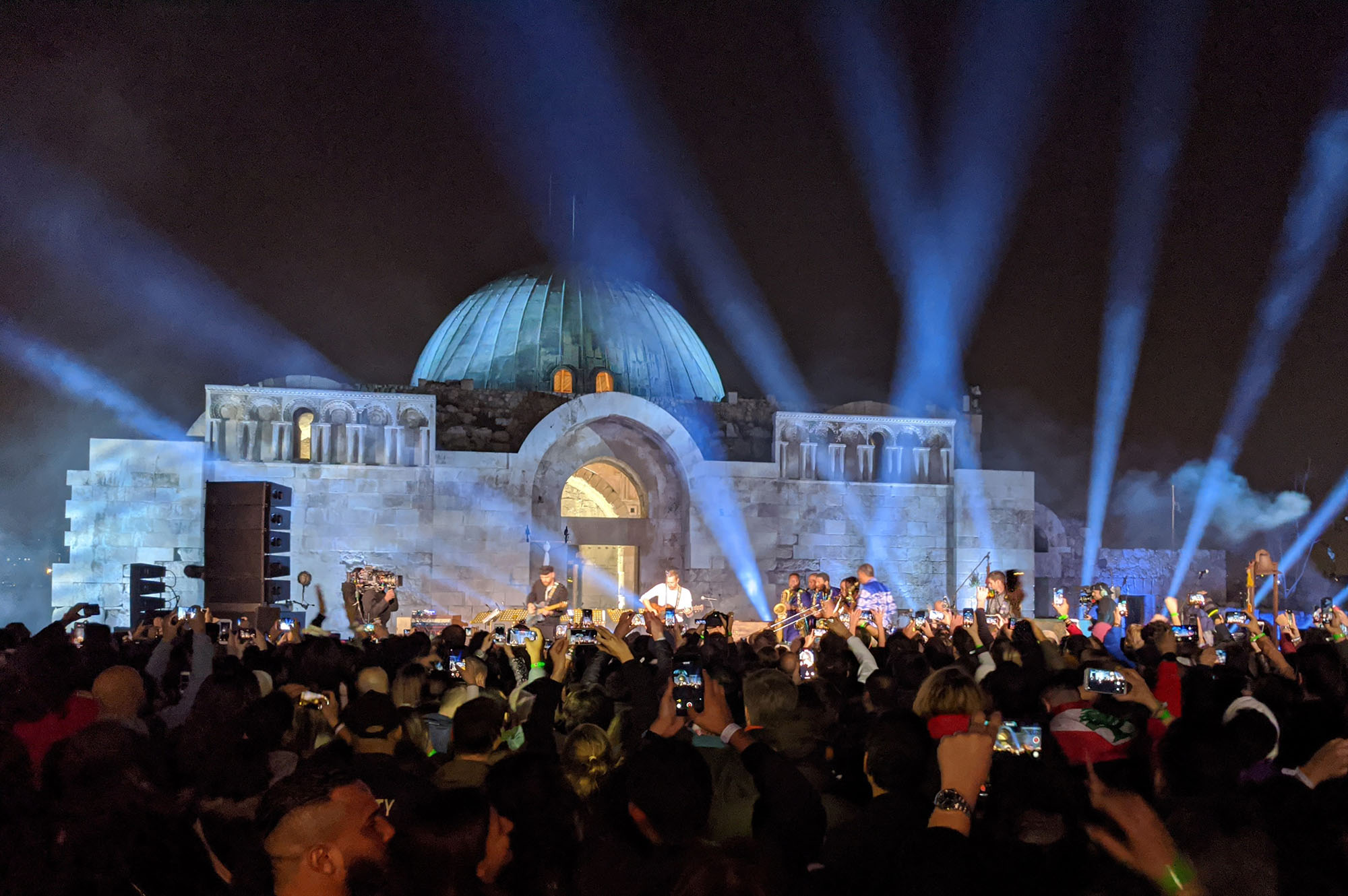
Hadani Ditmars
The commemoration of the 20th anniversary of 9/11 unfolds in televisual real time and yet with a strange sense of suspended animation, as if we’re on a slow motion merry go round that we can’t get off.
It’s not just that feeling of déjà vu all over again as the TV screen blares scenes from Taliban 2.1 meets Atwood’s Republic of Gilead; nor is it that familiar sense of la nausée as Bush plays elder statesman rather than architect of the “war on terror” (or the “war of terror” as Borat so aptly called it) that killed thousands more Iraqis and Afghans than the terrorists who attacked the towers of the World Trade Center. From his televisual pulpit, surrounded by past presidents like Clinton and Obama whose administrations bombed and starved Iraqis, when then weren’t killing Afghans and Yemenis with drones, or funding the occupation of Palestine, Bush decried both homegrown and more exotic strains of extremism as being “children of the same foul spirit.” Considering the long standing support of the CIA and other Western intelligence agencies for al-Qaeda and the Taliban — whose jihadist textbooks were paid for by the US and published in the Bible Belt — his unironic truth was possibly an understatement.
But it’s also that sinking feeling that you’ve been telling the same story for 30 years and no one is listening. Over the past three decades of reporting from the region, when questioned about the future of Afghanistan and Iraq, I would always reply, “To create a stable democracy you need to fund education and healthcare and support women and children. It’s not rocket science.” But actually, with hindsight, perhaps it was.
Rockets are big business, especially backed by pseudo feminist cheerleaders working for the Pentagon. While Afghan and Iraqi and Palestinian civilians were occupied, imprisoned, and killed in the name of Pax Americana, arms dealers raked in billions.
And now it’s all come full circle in a terrifying way.
But once there was a time when earnest cultural festivals tried to bring disparate groups together to celebrate life and even dance, not to fetishize death and weapons. In retrospect, my attendance at Amman’s Souk Ukaz — literally a cultural bazaar that coincided with 9/11 — may have been akin to Don Quixote tilting at windmills, but in many ways, it was also the best possible place to have witnessed events during that fateful week in early September 2001.
https://soundcloud.com/levantine-center/attending-souk-ukaz-during-the-week-of-september-11Instead of an international arms market, imagine if you will, a Middle Eastern cultural marketplace, perhaps hearkening back to the Silk Road, or even the first half of the 20th century; a place where poets and musicians, artists, filmmakers, and dealmakers come together to exchange ideas and sell their wares. Souk Ukaz was the brainchild of a Jordanian woman named Iman al-Hindawi, who wanted to re-create a market tradition she said stretched back to pre-Islamic times; one that would bring together not only artists from the Middle East and Africa, but also connect them with cultural institutions from the West. About one-third of the participants were Americans, many of them from New York.
Reality, of course, plagued the festival, which began on September 9.
The first day — complete with a dramatic performance by whirling dervishes, an appearance by the ravishing Queen Rania of Jordan, and an intelligent discourse on Islamic art by Princess Wajdan Ali —was marred by bad news from the occupied territories. Palestinian poet Mahmoud Darwish was trapped in Ramallah, under Israeli siege. He was scheduled to attend the opening of Algerian artist Rachid Koraichi’s stunning exhibit of calligraphy-inspired sculptures and etchings. The exhibit was described by curator Salah Hassan as speaking “directly to issues of memory, diaspora, exile and other aspects of the Arab experience.”
Then, the next day, September 10, news came that eight people had been killed just south of Baghdad, in an American bombing raid. Still the festival went on, with earnest workshops on cultural funding and collegial discussions about East/West film co-productions. But beyond official politesse, subtle but powerful lines were being drawn. A British/Jordanian musical exchange went disastrously wrong, with each group re-enforcing their worst cultural stereotypes. A Lebanese-Christian filmmaker’s views rubbed edgily against those of a Palestinian cultural activist. Meanwhile, it turned out that the main sponsors of the “globalization and Arabic culture”-themed festival were Texaco and Ford.
And then came September 11th, exactly the half-way point of this cultural marketplace.
News of events in America reached us as we were emerging from a workshop on “Arab images in Western media.” Mere minutes later, inflammatory images of ululating Palestinian women in East Jerusalem celebrating the attack were being broadcast around the world on CNN.
American participants left abruptly en masse and spent the next four days trapped in airports. The rest of us — including a Palestinian folk-dancing troupe from Ramallah which could not get back home because of the Israeli siege —carried on in a rather stunned state.
The evening of September 11th, we dutifully took a bus to Amman’s Citadel, the Roman ruins where King David dispatched Bathsheba’s husband to certain death in battle, itself one of the highest points in the city. Underneath a starlit sky, we listened to soothing Sufi music from Syria. Later, a group from Egypt called “Les Tambours de Nubie” played music that combined traditional Nubian melodies and African rhythms, with classical cello. Their closing number was a unique version of Beethoven’s “Song of Joy.” East and West had never seemed so close yet so far.
The mood on the Jordanian street was increasingly grim. Everyone was worried about the death of tourism, the only real industry in a country that had not been blessed with oil when the French and British were carving up the Middle East. A taxi driver, thinking I was American, offered his sincere condolences. When I told him I was Canadian, he inquired discreetly about visas and unemployment rates.
Thursday night, as the enormity of what had happened and the increasing certainty of war began to sink in, we were all bussed out to a beautiful spot in the country, where a Lebanese jazz band and a Nigerian group entertained us. As the Nigerian band sang a song that began “We are all brothers and sisters…” a bunch of us rather bewildered attendees —including Senegalese, British, Palestinian and one lone American (the only one who had stayed out of solidarity, a sweet natured teacher from Kansas) — slowly began to dance. As we moved and swayed together, any political or national “line-drawing” that had begun, melted into a sense of unity.
The next day, September 14, the festival continued with a rather Fellini-esque fashion show at the Dead Sea Moevnpick resort. Half a dozen designers from around the Arab world — Jordanian, Iraqi, Lebanese, Moroccan, Palestinian — showcased their work that mixed traditional artisanal designs with Western style couture. The evening was a fantasia of design possibilities that seemed to speak to the aesthetic dividends of peaceful co-existence.
The festival closed with a performance by Vienna-based Palestinian singer/songwriter Marwan Abado, minus his Austrian band members, who had been spooked by the thought of travel to the Middle East and cancelled at the last minute. Like an Arabic Leonard Cohen, Abado sang songs that transcended the political with their humor and humanity. In “Poem to the Moon” he sang of being freed from a “prison” that could be real or psychological.
I asked him afterwards about his feelings as an artist caught between East and West vis à vis the current “situation.” Abado responded that the most “surreal” experience of his performing life was representing Austria at a musical festival in Morocco. “When people ask me where I’m from,” he continued, “I say, ‘from Ottakring’ (a neighborhood in Vienna). Then I say I am Palestinian. Then a musician. But in the end, I can only say, ‘I am a human being.’”
The war on terror spawned by that fateful week would kill thousands of innocents in Afghanistan and Iraq, increase racial profiling and “extraordinary rendition” of Canadian citizens like Maher Arar, who was infamously deported to a Syrian prison by American authorities.
But for that one extraordinary week in September 2001, I was sheltered in a tiny oasis of peace, where culture trumped terror, and artists dreamed of happier futures. This is what I choose to remember today.



